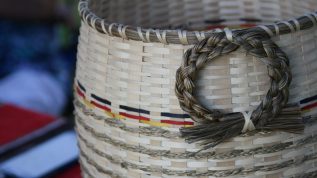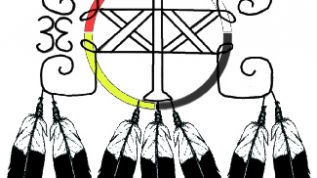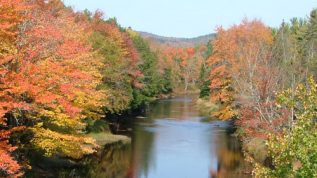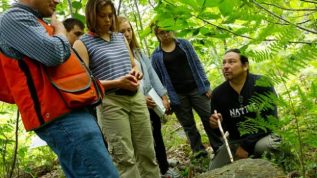Welcome to Native American Programs at the University of Maine! Here, you can access information about Native American Studies, the Wabanaki Center, the Native American Waiver and Education Program, and information about University of Maine programs that promote, support and provide educational opportunities for and about Wabanaki peoples across the State of Maine and beyond!
Native American Programs News
- Vermont Public highlighted new funding awarded to John Daigle, professor of forest recreation management at the University of Maine, for his work supporting indigenous forest […]
- Award-winning archaeologist and MacArthur Fellow Kristina Douglass will deliver the University of Maine Hudson Museum’s Archaeology Month Lecture at 7 p.m. on Tuesday, Oct. 28 […]
- Mainebiz.com reported the audiobook launch event for “Sea Run: A Study Regarding the Impact of Maine Policies on the Quality and Quantity of Traditional Tribal […]
- The Senator George J. Mitchell Center for Sustainability Solutions at the University of Maine will host a panel discussion about land return, rematriation and conservation […]
- WABI (CBS 5 in Bangor) and WFVX (FOX 22/ABC 7 in Bangor) covered the 30th annual Wabanaki Winter Market that took place at the University […]
- The largest holiday gathering of Wabanaki artists in New England will return with one-of-a-kind pieces, including some from new and nationally acclaimed basket weavers, on […]
University of Maine Land Acknowledgement
The University of Maine recognizes that it is located on Marsh Island in the homeland of the Penobscot Nation, where issues of water and territorial rights, and encroachment upon sacred sites, are ongoing. Penobscot homeland is connected to the other Wabanaki Tribal Nations—the Passamaquoddy, Maliseet, and Micmac—through kinship, alliances, and diplomacy. The University also recognizes that the Penobscot Nation and the other Wabanaki Tribal Nations are distinct, sovereign, legal and political entities with their own powers of self-governance and self-determination.




